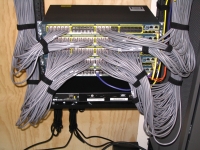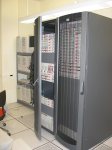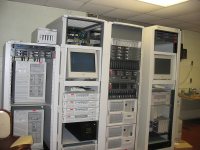Physics Computer Support Center
Physics Department, Kansas State University
Highlights:
The Physics Computing Support Center was established in 1997 to bring order to the chaos that then reigned over computing in the Physics department. It was originally known as the Physics Computer Support Team, and grew out of our electronics repair shop. It has long since absorbed the old shop and become critical to the operation of the department. PCSC provides both hardware and software support to the Physics department (and to several other KSU units).
General computing in Physics is based on Windows desktops and an extensive Windows Server and Exchange "back office". A wide range of productivity software is available. Several research networks of Linux machines are supported, as are several high-performance computing clusters.
PCSC is overseen by the department's Computing committee. The committee usually meets about once a semester and is chaired by Lado Samushia.
Requirements:
There are minimum requirements your computer must meet before being connected to the Physics network. Please consult these requirements before purchasing a machine or asking PCSC for support.
New Users:
If you are new to the Physics Department, welcome! We have tutorials to get you started in video form and as a PowerPoint presentation. Be sure to explore the menu sidebar of this site for many links to tutorials or other resources to get you started. As always, specific questions can be directed to us at pcschelp@phys.ksu.edu.
News:
- K-State requires the use of their Virtual Private Network (VPN) before you can connect via either Remote Desktop or Secure Shell (SSH). Read the details about VPN use at the Division of Information Technology's Virtual Private Network page or see our video tutorial on how to set it up.
- There is now a computing tutorials playlist in the K-State Physics YouTube channel. Our introductory tutorial and a new K-State VPN tutorial live there now.
- There is now a dedicated laptop living on the podium in CW119 for all to use, along with the other media devices that support presentations and videoconferences. We have both basic and advanced tutorials on how it all works.
- How to access library materials from home, and news about open-access resources.
- IT security training is available, is in your and our best interest, and is required by KSU. Note, too, that in the wake of the Spring 2024 security incident policies are rapidly evolving and accessibility of many services will be changing. See news about campus cybersecurity and the status of the University's IT systems (the latter requiring an eID login).
- Kansas State participates in a worldwide shared educational wireless network called Eduroam. You can log into any Eduroam wireless network anywhere using your K-State credentials (username@k-state.edu). For more details, visit K-State's Eduroam service pages here or here.



